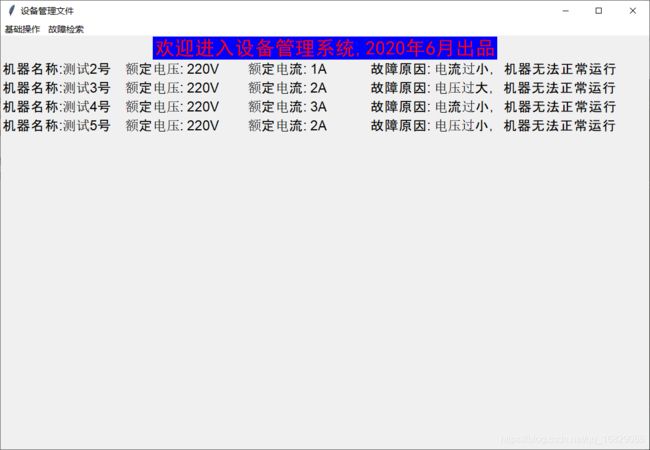设备管理系统-基于Tkinter的小案例
基于Tkinter,做了一个简易的设备管理系统。
文件格式
状态获取.txt 文件格式如下:
机器名称:测试4号 220V 2.5A
代码如下
import tkinter as tk
import tkinter.messagebox as msg
import re
Machines_list = ['机器名称', '额定电压', '额定电流', '故障原因', '故障名称', '故障地点']
# 检验文件路径
filepath = '.\检验文件.txt'
# 状态文件
infile = '.\状态获取.txt'
str_print = "{}\t {}V\t {}A\t {}\t {}\t {}\n"
# 字体设置
font = ('Arial', 14)
def clear():
# 清空框架
for widget in frame.winfo_children():
widget.destroy()
def write_information(entrys):
"""
信息写入
Arguments:
frame {[type]} -- [description]
entrys {[type]} -- [description]
"""
infos = []
for entry in entrys:
infos.append(entry.get())
# 解包
n_g, u_g, i_g, h_g, r_g, k_g = infos
with open(filepath, 'a', encoding='utf-8') as file_object:
file_object.write(str_print.format(n_g, u_g, i_g, h_g, r_g, k_g))
# 提示保存成功
msg.showinfo('success', '保存成功')
def input_information():
"""
信息输入
"""
clear()
# 要保存的信息
entrys = []
# 录入信息
for row, info in enumerate(Machines_list):
tk.Label(frame, text=info, font=font).grid(row=row, column=0)
entry = tk.Entry(frame, font=font)
entry.grid(row=row, column=1)
entrys.append(entry)
# 确认按钮
btn_comfirm = tk.Button(
frame, text='录入', command=lambda: write_information(entrys))
btn_comfirm.grid(row=6, column=2)
def show_information():
"""
展示机器信息
"""
clear()
str_print = "机器名称:{}\t额定电压:{}\t额定电流:{}\t故障原因:{}\t故障名称:{}\t故障地点:{}"
with open(filepath, 'r', encoding='utf-8') as f:
lines = f.readlines()
lines = lines[1:]
for row, line in enumerate(lines):
# 跳过空行
line = line.strip()
if not line:
continue
infos = line.split('\t')
tk.Label(frame, text=str_print.format(
infos[0], infos[1], infos[2], infos[3], infos[4], infos[5]), font=font).grid(row=row, column=0)
def read_information(entry, res_frame):
# 清空res_frame
for widget in res_frame.winfo_children():
widget.destroy()
# 查询关键字
key = entry.get()
flag = False
row = 2
str_print = "{}\t {}\t {}\t {}\t {}\t {}"
with open(filepath, 'r', encoding='utf-8') as f:
lines = f.readlines()
lines = lines[1:]
for line in lines:
infos = line.split('\t')
infos = list(map(lambda x: x.strip(), infos))
if key in infos:
tk.Label(res_frame, text=str_print.format(
infos[0], infos[1], infos[2], infos[3], infos[4], infos[5]), font=font).grid(row=row, column=0)
flag = True
row += 1
if flag:
# 提示查询成功
msg.showinfo('success', '成功检索到您输入的机器信息')
else:
msg.showinfo('failed', '未检索到您输入的机器信息')
def search_information():
clear()
tk.Label(frame, text='请输入需要查询的关键字', font=font).grid(row=0, column=0)
entry = tk.Entry(frame, font=font)
entry.grid(row=0, column=1)
# 查询结果显示框架
res_frame = tk.Frame(frame, height=400, width=400)
res_frame.grid(row=2, column=1)
# 确认按钮
btn_comfirm = tk.Button(
frame, text='查询', command=lambda: read_information(entry, res_frame))
btn_comfirm.grid(row=1, column=1)
def drop_information(entry, res_frame):
# 清空res_frame
for widget in res_frame.winfo_children():
widget.destroy()
# 删除关键字
key = entry.get()
flag = False
row = 2
with open(filepath, 'r', encoding='utf-8') as f:
lines = f.readlines()
with open(filepath, 'w', encoding='utf-8') as f:
for i, line in enumerate(lines):
# 写入表头
if i < 1:
f.write(line)
continue
infos = line.split('\t')
if key in infos:
tk.Label(res_frame, text=str_print.format(
infos[0], infos[1], infos[2], infos[3], infos[4], infos[5]), font=font).grid(row=row, column=0)
flag = True
row += 1
continue
# 写入
f.write(line)
if flag:
# 提示查询成功
msg.showinfo('success', '成功删除')
else:
msg.showinfo('failed', '删除失败,未检索到您输入的机器信息')
def delete_information():
"""
删除信息
"""
clear()
tk.Label(frame, text='请输入需要删除的信息关键字', font=font).grid(row=0, column=0)
entry = tk.Entry(frame, font=font)
entry.grid(row=0, column=1)
# 删除结果显示框架
res_frame = tk.Frame(frame, height=400, width=400)
res_frame.grid(row=2, column=1)
# 确认按钮
btn_comfirm = tk.Button(
frame, text='删除', command=lambda: drop_information(entry, res_frame))
btn_comfirm.grid(row=1, column=1)
def save_information(entrys, line_numbers):
with open(filepath, 'r', encoding='utf-8') as f:
lines = f.readlines()
# 保存文件
str_print = "{}\t {}\t {}\t {}\t {}\t {}"
with open(filepath, 'w', encoding='utf-8') as f:
# 表头写入
f.write(lines[0])
lines = lines[1:]
for i, line in enumerate(lines):
if i in line_numbers:
index = line_numbers.index(i)
row_entory = entrys[index]
row = list(map(lambda x: x.get(), row_entory))
n_g, u_g, i_g, h_g, r_g, k_g = row
f.write(str_print.format(n_g, u_g, i_g, h_g, r_g, k_g))
else:
f.write(line)
msg.showinfo('success', '修改已完成')
# 展示信息
show_information()
def modify(entry, res_frame):
# 清空res_frame
for widget in res_frame.winfo_children():
widget.destroy()
# 顶头
for col, info in enumerate(Machines_list):
tk.Label(res_frame, text=info, font=font).grid(row=0, column=col)
# 修改关键字
key = entry.get()
flag = False
row = 1
# 要修改的内容
entrys = []
# 在文件中的行数
line_numbers = []
with open(filepath, 'r', encoding='utf-8') as f:
lines = f.readlines()
lines = lines[1:]
for i, line in enumerate(lines):
infos = line.split('\t')
if key in infos:
text = tk.StringVar()
text.set("在文件中的行数{}".format(i))
line_numbers.append(i)
entry = tk.Entry(
res_frame, textvariable=text, width=10, font=font)
# 保存每行entory
row_entory = []
# 展示查询内容
for col, info in enumerate(infos):
text = tk.StringVar()
text.set(info)
entry = tk.Entry(
res_frame, textvariable=text, width=10, font=font)
entry.grid(row=row, column=col)
row_entory.append(entry)
flag = True
row += 1
entrys.append(row_entory)
if not flag:
# 提示没有信息
msg.showinfo('failed', '未检索到您输入的机器信息')
# 确认按钮
btn_comfirm = tk.Button(
res_frame, text='确认', command=lambda: save_information(entrys, line_numbers))
btn_comfirm.grid(row=row, column=1)
def modify_information():
"""
修改
"""
clear()
tk.Label(frame, text='请输入需要修改的机器信息', font=font).grid(row=0, column=0)
entry = tk.Entry(frame, font=font)
entry.grid(row=0, column=1)
# 查询结果显示框架
res_frame = tk.Frame(frame, height=400, width=400)
res_frame.grid(row=2, column=0)
# 按钮
btn_comfirm = tk.Button(
frame, text='修改', command=lambda: modify(entry, res_frame))
btn_comfirm.grid(row=1, column=1)
def loadDatadet():
# 加载故障文件
f = open(infile, "r", encoding='utf-8')
source_in_line = f.readlines()
dataset = []
for line in source_in_line:
temp = re.split('\t|:', line)[1:]
dataset.append(temp)
return dataset
def trouble():
"""
故障检索
"""
clear()
m_list = loadDatadet()
n_g, u_g, i_g = m_list[0]
u_g = re.findall('\d+', u_g)[0]
i_g = re.findall('\d+', i_g)[0]
u_g = float(u_g)
i_g = float(i_g)
str_print_1 = "机器名称:{}\t实时电压:{}V\t实时电流:{}A"
tk.Label(frame, text='实时数据', font=font).grid(row=0, column=0)
tk.Label(frame, text=str_print_1.format(n_g, u_g, i_g),
font=font).grid(row=1, column=0)
tk.Label(frame, text='额定数据', font=font).grid(row=2, column=0)
tk.Label(frame, text='检索结果', font=font).grid(row=2, column=1)
row = 3
flag = False
str_print_2 = "机器名称:{}\t额定电压:{}V\t额定电流:{}A"
with open(filepath, 'r', encoding='utf-8') as f:
lines = f.readlines()
lines = lines[1:]
for line in lines:
infos = line.split('\t')
# 跳过空行或非对应机器
if not line.strip() or n_g != infos[0]:
continue
u_1 = re.findall('\d+', infos[1])[0]
i_1 = re.findall('\d+', infos[2])[0]
u_1 = float(u_1)
i_1 = float(i_1)
# 校验
text = ''
if u_g * 0.95 <= u_1 <= u_g * 1.05:
flag = True
text = text+"\t电压状况良好"
else:
text = text+"\t电压出现故障"
if i_g * 0.95 <= i_1 <= i_g * 1.05:
flag = True
text = text+"\t电流状况良好"
else:
text = text+"\t电流出现故障"
tk.Label(frame, text=str_print_2.format(infos[0], u_1, i_1),
font=font).grid(row=row, column=0)
tk.Label(frame, text=text, font=font).grid(row=row, column=1)
row += 1
if not flag:
# 提示信息
msg.showinfo('info', '没有检索到故障信息')
else:
msg.showinfo('info', '故障信息检索完毕')
# 实例化窗口
root = tk.Tk()
root.title("设备管理文件")
# 大小设置
root.geometry('1000x700')
lable = tk.Label(root, text="欢迎进入设备管理系统,2020年6月出品",
bg="blue", fg="red", font=("黑体", 20))
lable.pack()
# 框架
frame = tk.Frame(root, height=600, width=1000)
frame.pack()
# 创建顶级菜单
menu = tk.Menu(root)
# 基础操作
basic_menu = tk.Menu(menu)
menu.add_cascade(label='基础操作', menu=basic_menu)
basic_menu.add_command(label='录入本部机器信息', command=input_information)
basic_menu.add_command(label='显示全部机器信息', command=show_information)
basic_menu.add_command(label='查询录入机器信息', command=search_information)
basic_menu.add_command(label='删除录入机器信息', command=delete_information)
basic_menu.add_command(label='修改录入机器信息', command=modify_information)
# 故障检索
malfunction = tk.Menu(menu)
menu.add_cascade(label='故障检索', menu=malfunction)
malfunction.add_command(label='开始检索', command=trouble)
# 显示菜单
root.config(menu=menu)
# 主窗口循环
root.mainloop()

